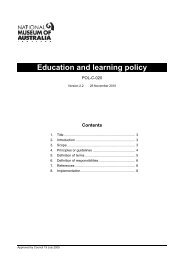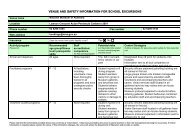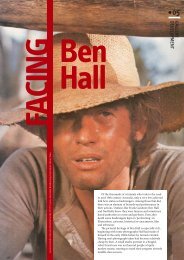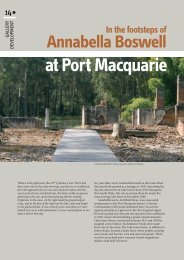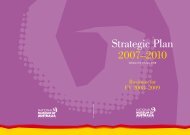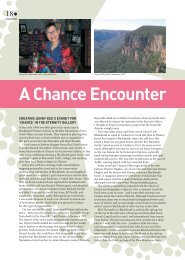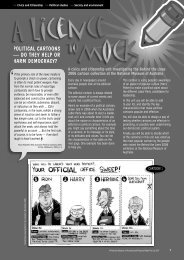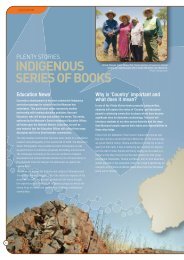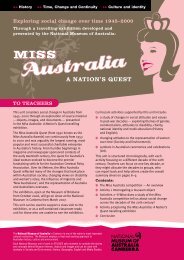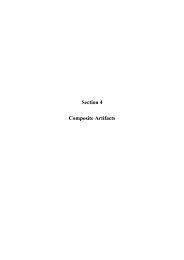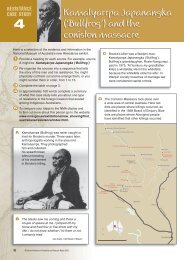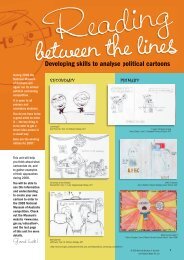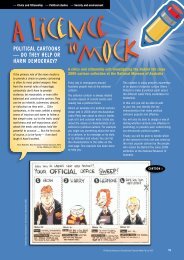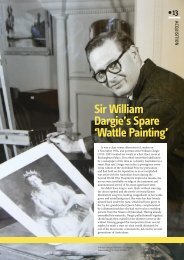Yiwarra Kuju: The Canning Stock Route â education kit - National ...
Yiwarra Kuju: The Canning Stock Route â education kit - National ...
Yiwarra Kuju: The Canning Stock Route â education kit - National ...
- No tags were found...
Create successful ePaper yourself
Turn your PDF publications into a flip-book with our unique Google optimized e-Paper software.
Before <strong>Canning</strong> made those lines of wells,it was all family groups — tribes andlanguage groups that were related …Nowadays we are living [in differentplaces], everybody moved, separated todifferent part of the Western Desert, todifferent towns: Fitzroy Crossing, Newman,Jigalong, Balgo, Broome, Bidyadanga. Andthat connection is still alive today in theheart of the desert … We all one mob. Allone people. <strong>Canning</strong> <strong>Stock</strong> <strong>Route</strong> is anotherhistory. It’s the European version. But nowwhat we’re talking about is how … dailylives were all connected back through songand dance and Dreaming and the desert.Murungkurr Terry Murray, 2009Before the surveying of the <strong>Canning</strong> <strong>Stock</strong> <strong>Route</strong> every aspect of the Country hadbeen mapped. Around 15 different language groups or ‘tribes’ lived in the areatransected by the stock route and other groups were linked to the area throughthe Dreaming tracks which crossed the Country, forming the basis of ceremonialinteractions. <strong>The</strong> <strong>Canning</strong> <strong>Stock</strong> <strong>Route</strong> is the road that many Aboriginal peoplefollowed out of their desert world. Over many years people at different times andfor different reasons moved out of their home Country and onto the fringes of a newworld that is called Australia.People moved to places on the edges of the desert. <strong>The</strong>y moved to the outskirtsof towns like Halls Creek and Meekatharra, stations such as Ullulla and Billiluna,settlements such as Jigalong and missions such as Warburton and Balgo. Peoplefrom across the Western Desert, speaking many languages, arrived at these placesand established communities. Because of the similarities in language, and becausemost people spoke several languages, communication was not difficult. Culturalsimilarities, including the kinship and Dreaming networks as well as a strong traditionof cooperation, meant that people congregating in these communities were ableto forge new cultural identities without letting go of the beliefs and understandingwhich had been their way of life for thousands of years.People who travelled north to Bidyadanga from their home in the Great Sandy Desertbecame known by and identified with the name Yulparija, which means ‘southerner’.People who travelled east to places such as Papunya became the Pintupi, ‘peoplefrom the west’, and people from the southern stock route collectively became theMartu which means Aboriginal person or ‘one of us’.1We all go together like one big family, from one area. Even though we come fromdifferent language groups, we’re all one. And from that ‘one’ is that one history ofall the whole road.Putuparri Tom Lawford, 20091Paruku and Walmajarri People,2007, by Veronica Lulu,Warlayirti Artists,<strong>National</strong> Musuem of Australia<strong>The</strong> concept of Walyja or family is at the heart of Western Desert society. It is afar broader idea of relatedness than is commonly associated with family in non-Aboriginal societies. Kinship has always been the basis of Aboriginal social relations.It includes all relationships, not only those of blood or marriage. From the outside,kinship systems seem very complex but children learn from a very early age howthey are connected to this meaningful network. <strong>The</strong> system of relationships isreferred to as the ‘skin system’ and was created by the Jukurrpa ancestors. Skingroups dictate the appropriate behaviour between people and their obligationsand responsibilities toward one another. Brothers belong to the same skin group,therefore for a child, a father’s brother is also ‘father’ rather than uncle. Children ofbrothers belong to their own skin group and refer to each other as brother and sister,not cousin. <strong>The</strong>se relationships were impacted upon but not really changed whencommunities consisting of various language groups were formed as people travelledalong the stock route away from their own Country.It’s good for whitefellas and young people like us to know the connection …To know that we all just connected no matter what different language wespeak, but we just one family … We all just connected through our skin colours.Hayley Atkins, 2009Aboriginal people often moved in times of drought, especially during the late 1920s,the early 1940s and mid-1950s to places where food was easier to get. Sometimespeople moved for cultural or family reasons. Not all followed the stock route. Somestrategically avoided it. However, it was the existence of the <strong>Canning</strong> <strong>Stock</strong> <strong>Route</strong>,and the people that it brought into their world, that acted as a catalyst for Aboriginalpeople to move. <strong>The</strong> sock route transformed the social and cultural landscape of thedesert forever.JigalongJigalong is located 165 kilometres east of the town of Newman. It was established in1907 as the location for a maintenance and rations store for workmen constructingthe rabbit-proof fence. In the 1930s it was used as a camel-breeding site and in1947 the land was granted to the Apostolic Church to set up a Christian mission forthe Aboriginal community which had grown up around the site. In the 1920s anextensive drought in the Western Desert caused people to move in search of foodand water. Some made their way to Jigalong where they replenished themselves.<strong>The</strong>y returned to their communities and informed others that food was available atthe depot. People began to migrate to be near the rations store. <strong>The</strong>se migrations



